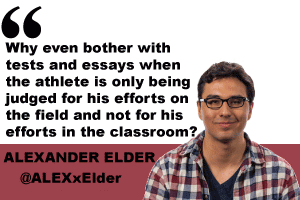 Should universities offer degrees in athletic performance?
Should universities offer degrees in athletic performance?
This deceptively straightforward solution arose in response to the recent push for student-athlete unionization as well as the University of North Carolina Chapel Hill scandal concerning bogus classes.
While I certainly can understand some of the reasons behind such a proposal — a degree in athletic performance differs very little from many of the other performing arts (music, dance, opera) that colleges offer — it’s ultimately a last-ditch effort to shortchange college athletes out of their hard work by preserving the charade of the “student-athlete.”
Although a sports education is similar to an education in the fine arts, I believe the former is fundamentally inferior to the latter in terms of academic value. For one, the fine arts encourage and sometimes even require a more intellectual foundation that allows students to become well-rounded.
Sports, on the other hand, stress repetition and the singular objective of winning. Beyond the prospect of a professional career, sports offer very little in the way of understanding the world and its nuances. I don’t think this is a proper foundation for a college degree.
Moreover, to equate an athlete’s performance on the field with his education drops the “student” pretense in everything but name. Why even bother with exams and papers when the athlete is only being judged for his efforts on the field and not for his efforts in the classroom?
Considered solely on their academic merits, many of these “student-athletes” should not even be considered “students” in the traditional sense. From drastically lower SAT scores to rampant grade scandals, it appears most college athletes have been shuffled through the educational system on the sole basis of their athletic capabilities, despite glaring deficiencies in reading and writing.
But such underperformance is no surprise in light of the demands placed on the average college athlete. In the billion-dollar enterprise that is U.S. college athletics, most universities require athletes to follow intensive training programs and also discourage higher level learning. Factor in all the time away spent playing against other teams, and it becomes hard to fault the college athlete for shoddy coursework when the university is setting such low standards.
We should just drop the “student-athlete” pretense altogether and candidly call these athletes what they really are: semi-professional sports players with free access to higher education.
Simply allow athletes to play without coercing them into taking classes. Aside from making the athletes eligible for payment, this change in status would eliminate the need for phony classes, grade inflation and SAT-related impostor scandals. This change would also offer the vast majority of athletes who are not destined for stardom the choice to obtain a degree while making some cash on the side.
Athletic performance has no place in the academic curriculum. It's time colleges drop this facade and allow athletes to gain their just deserts.
Reach the columnist at Alexander.Elder@asu.edu or follow him on Twitter @ALEXxElder
Editor’s note: The opinion presented in this column is the author’s and does not imply any endorsement from The State Press or its editors.
Want to join the conversation? Send an email to opiniondesk.statepress@gmail.com. Keep letters under 300 words and be sure to include your university affiliation. Anonymity will not be granted.




